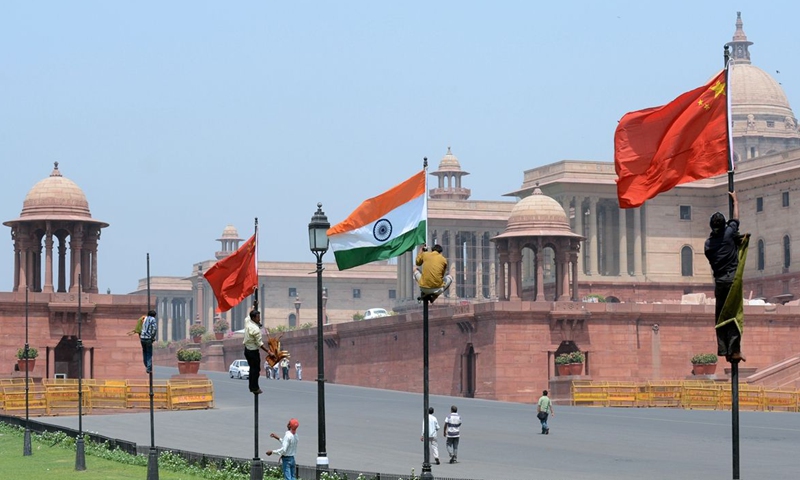
China India Photo:AFP
India has appointed a senior diplomat, who can speak Chinese fluently and with rich experience in diplomatic negotiations, to be its new ambassador to China, and this might be a positive sign for China-India relations, experts said, but stressed that "know China well" doesn't necessarily mean "be friendly to China" because Indian diplomats' behavior is driven by India's internal politics.
If the Indian government refuses to be pragmatic to fix damaged ties, to stop hyping a hostile sentiment toward China within its country, then the recovery of China-India ties is impossible regardless of who is appointed as ambassador, Chinese analysts warned.
According to the press release of the Ministry of External Affairs of India on Monday, Shri Pradeep Kumar Rawat, presently Ambassador of India to the Netherlands, has been appointed as the next Ambassador of India to the People's Republic of China.
Indian media reported that Rawat is an experienced and professional diplomat who can "speak fluent Mandarin [Putonghua]" and with deep ties with China. He had served as an Indian diplomat in Hong Kong and Beijing between 1992 and 1997. He returned to Delhi in 1997 and served in the East Asia Division for over 3 years. He then served as first secretary in the Indian mission in Mauritius.
He started his second tenure in Beijing in 2003 as a counselor and ended the tenure in 2007 as deputy chief of mission.
Rawat has a Chinese name, "Luo Guodong," and many Chinese experts on Indian studies are familiar with him.
"He has extensive knowledge on relations between China and India based on his long experiences in dealing with bilateral matters," Qian Feng, director of the research department at the National Strategy Institute at Tsinghua University, told the Global Times on Tuesday.
"Knowing China well doesn't necessarily mean being friendly to China. Some former Indian ambassadors to China also showed positive signs before coming to China, but eventually played very limited roles in saving China-India ties from getting worse," said Lin Minwang, a professor at the Institute of International Studies of Fudan University.
Hu Zhiyong, a research fellow at the Institute of International Relations of the Shanghai Academy of Social Sciences, told the Global Times that "no matter who is appointed as ambassador, if the Indian government doesn't change its hostile policy toward China, refuses to fix the damaged ties, and keeps hyping an anti-China sentiment within its country, the bilateral ties would be difficult to return to the right track."
Lin said "Rawat is a diplomat that know China well but to what extent he could be constructive remains a question. We hope he could at least be more reasonable, and this is the most that we can expect at the moment."
Chinese State Councilor and Foreign Minister Wang Yi said on Monday that China and India have maintained dialogue through diplomatic and military channels, and effectively managed and controlled frictions in certain border regions.
On December 6, 2021, Wang held a virtual meeting with outgoing Indian Ambassador to China Vikram Misri, who is returning to his country.
Wang put forward the "three do's and three don'ts" for China-India relations. First, we need to understand each other and don't misunderstand and misjudge each other. Second, we need to take a long-term view and don't be disturbed by one moment or one thing. Third, we need to build each other up and don't wear each other out. The two sides can and should continue to stand together on major goals that involve the common interests of developing countries.
Even if China and India have faced tensions over the borders in recent years, both sides are still seeking more channels to "take a long-term view" instead of bothering with particular incidents, Qian said.
As ambassador, Rawat's duty is to determine how to serve as a "bridge" to push forward the bilateral relations, Qian said. Rawat has witnessed the time when China and India had good relations, especially during the past 20 years, and he understands the problems between China and India, and it's possible that he will play a better role than other diplomats who don't know China, according to Qian.
However, an ambassador will not be a major factor to facilitate bilateral relations, as relations between China and India are affected by many factors, including decision-makers from both sides, as well as the efforts and communications made by NGOs, Qian said.
To serve their own political interests and ambitions, some Indian diplomats who used to serve in China will also turn into anti-China hardliners when they return to China, such as Vijay Keshav Gokhale, said Chinese experts.
"Being hostile to China will win the support of the US or Japan, and also please conservative forces in India. So 'know China well' but 'be hostile to China' is a good choice for some Indian diplomats, but this will definitely harm the fundamental interests of the peoples of the two nations," Hu said.




